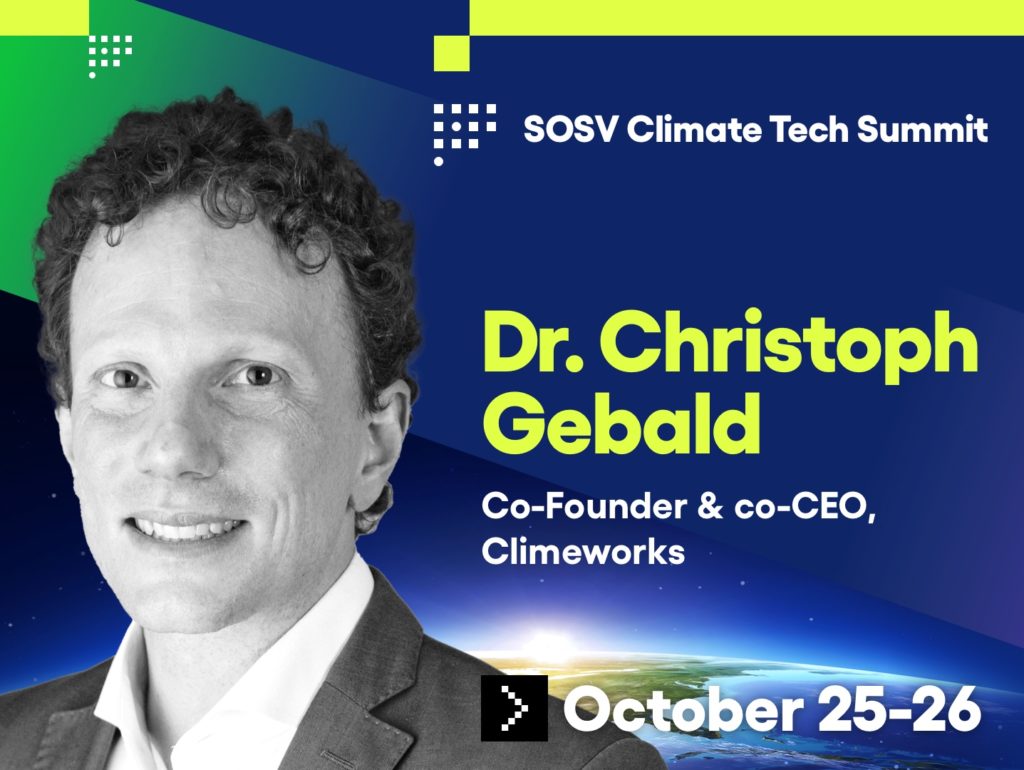With global CO2 emissions at an alarming 50 gigatons annually, the IPCC now believes that averting a climate catastrophe will be impossible unless we act to remove carbon directly from the atmosphere. Direct air capture (DAC) has emerged as a promising but controversial solution. DAC systems suck in air like a vacuum cleaner and filter out the CO2 for permanent storage or reuse. But even if DAC could remove CO2 at the economically viable “holy grail” cost of $100 per ton (versus $500 to $1,800 per ton today for various carbon capture techniques), offsetting 50 gigatons would cost about $5 trillion per year. Who will pay for it?
Swiss DAC startup Climeworks‘ co-founder and co-CEO, Dr. Christoph Gebald, tackled that question and many others at the SOSV Climate Tech Summit (Oct. 25-26). Check out the recorded session titled, “Can direct air capture save the day?” below.
Climeworks is a Zurich-based direct-air-capture startup that in September 2021 launched Orca, a production direct-air-capture facility in Iceland, and in April this year became a unicorn following a $639 million round led by co-led by Partners Group and GIC and including John Doerr, Baillie Gifford, and Carbon Removal Partners, among others.
The question of who will pay for carbon removal takes a new turn when the Manchin-Schumer Inflation Reduction Act becomes law, as it’s likely to do.
As Bloomberg Green reported: “The new bill is projected to increase the use of carbon capture and storage technologies by a multiplier of 13 by 2030, according to the Princeton researchers. The incentives included in the bill would “make carbon capture a viable economic option for the most heavily emitting technologies,” including steel, cement, coal and natural gas plants, they found.”
The time looks perfect for Climeworks. The firm broke ground this year in Iceland for its second plant – this one called Mammoth – with 9x the capacity of Orca. The plant is projected to capture 36,000 tons of CO2 per year powered by 100% renewable Icelandic geothermal and hydroelectric energy. 36Kt CO2 is barely one millionth of what’s needed to make a major dent in the problem, but there is growing commercial demand for the carbon credits DAC can generate, which should accelerate investment, along with the new US legislation.
Indeed, Microsoft recently signed a 10-year carbon offtake agreement with Climeworks to remove 10,000 tons of carbon from the atmosphere. There are several other DAC companies gearing up to compete, including Mission Zero, Heirloom, Noya, Verdox, among others.
Kim Zou, co-founder of Climate Tech VC (CTVC), a top source of insights on climate tech innovation and funding, interviewed Dr. Gebald.
Can DAC companies like Climeworks remove CO2 at global scale and foster a market to make their business sustainable? The answer has never been more urgent.
Dr. Christoph Gebald is the co-Founder and co-CEO of Climeworks, a direct air capture company based in Switzerland. Climeworks focuses on capturing and storing CO2 from the air to permanently remove it from the atmosphere. A mechanical engineer by training, Dr. Gebald researched direct air capture during his PhD at ETH Zurich and co-founded Climeworks in 2009 to apply what he discovered.

